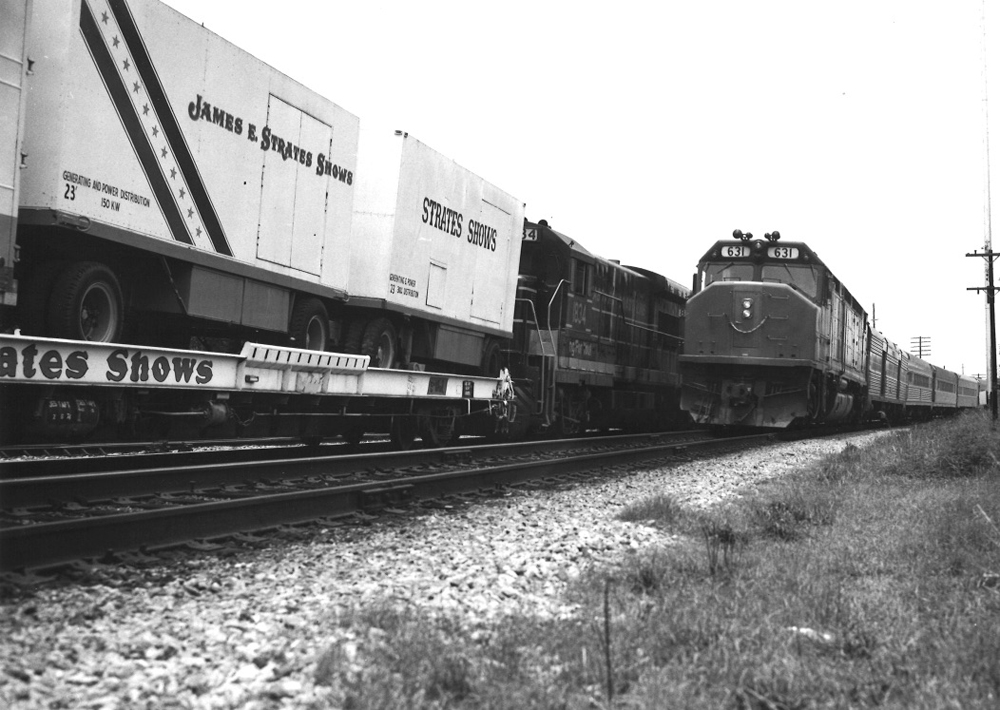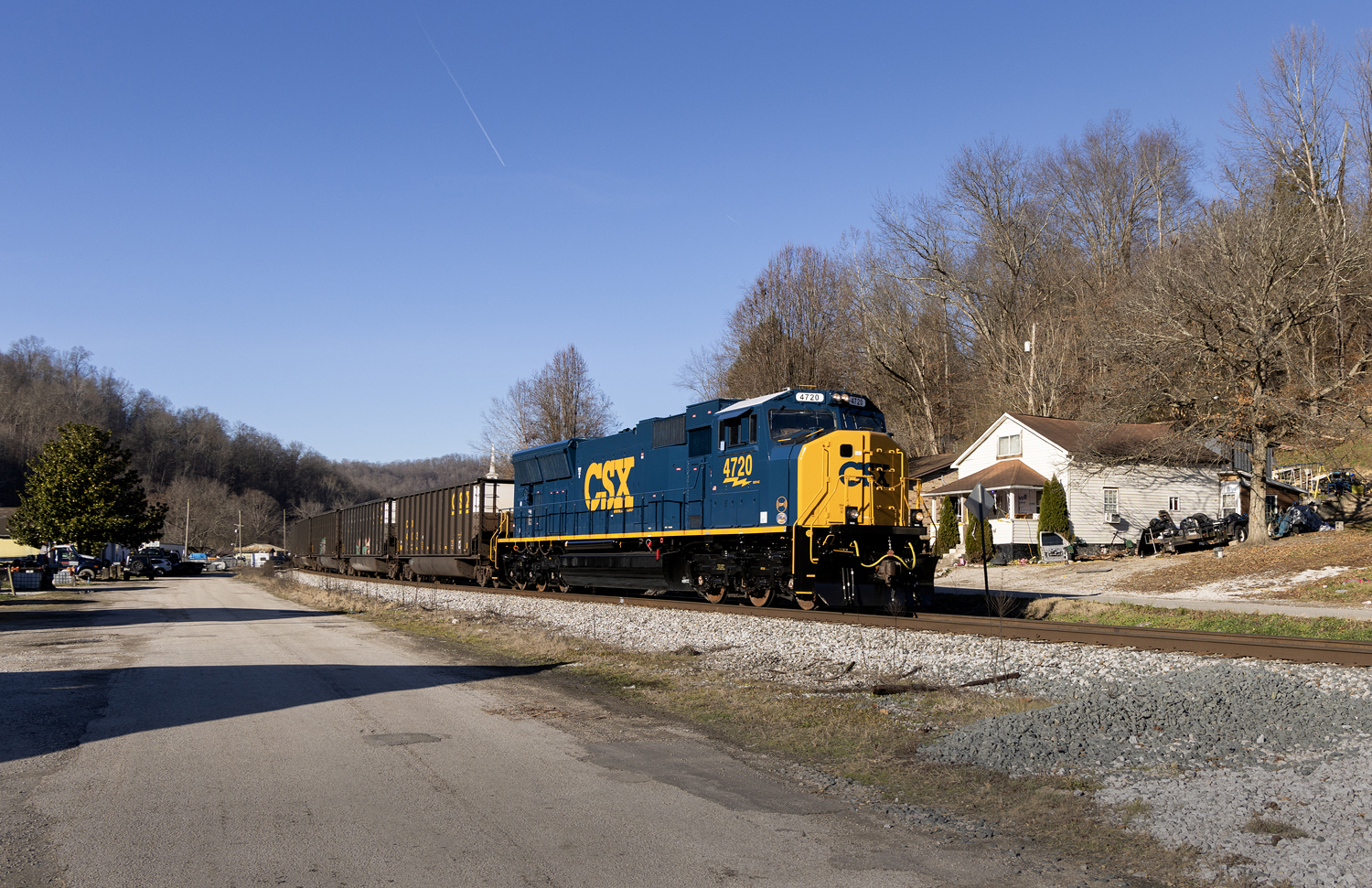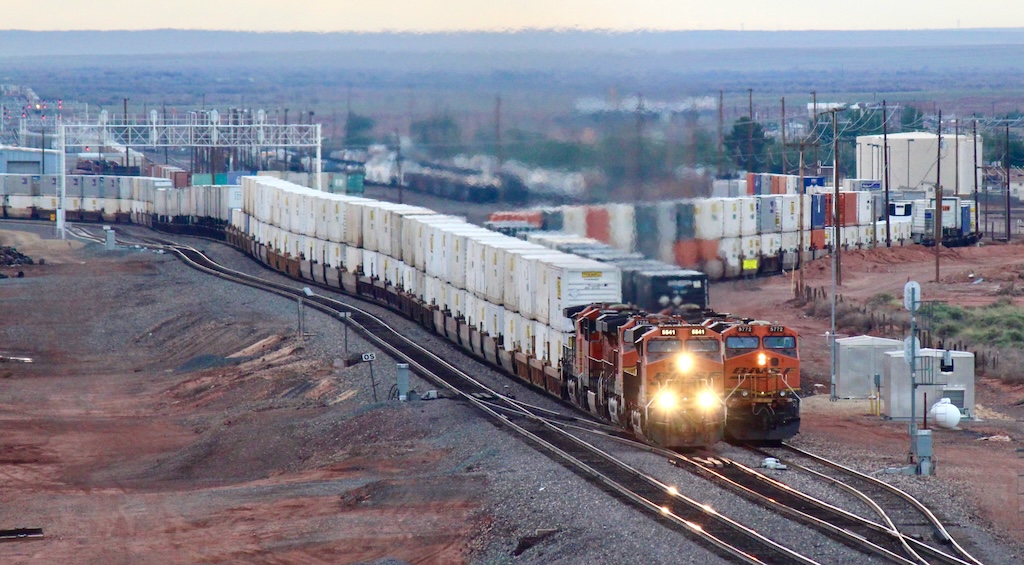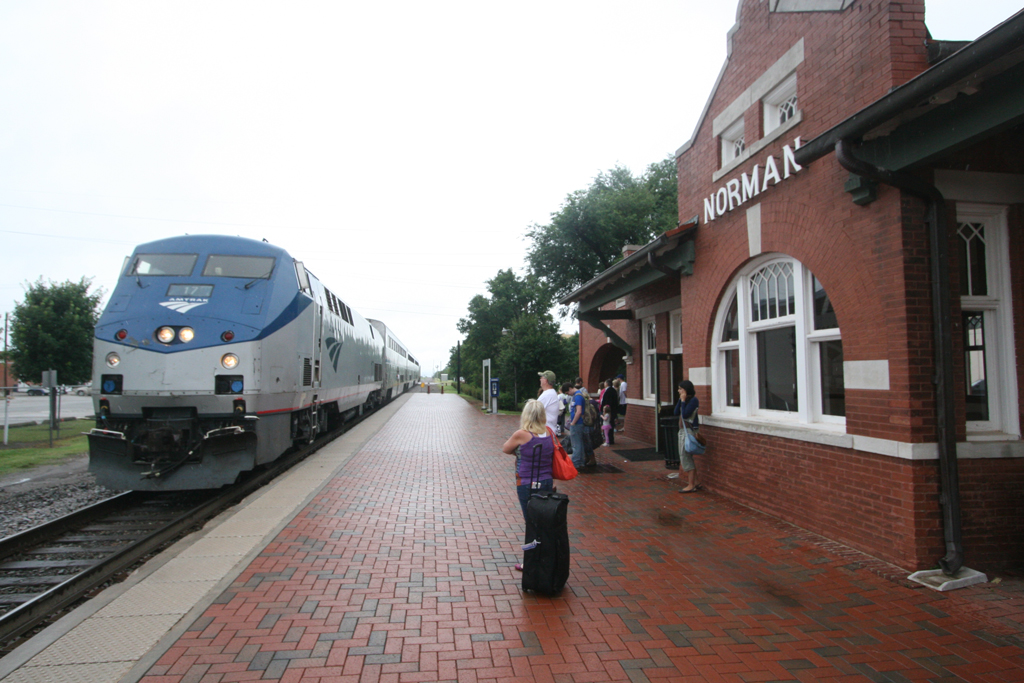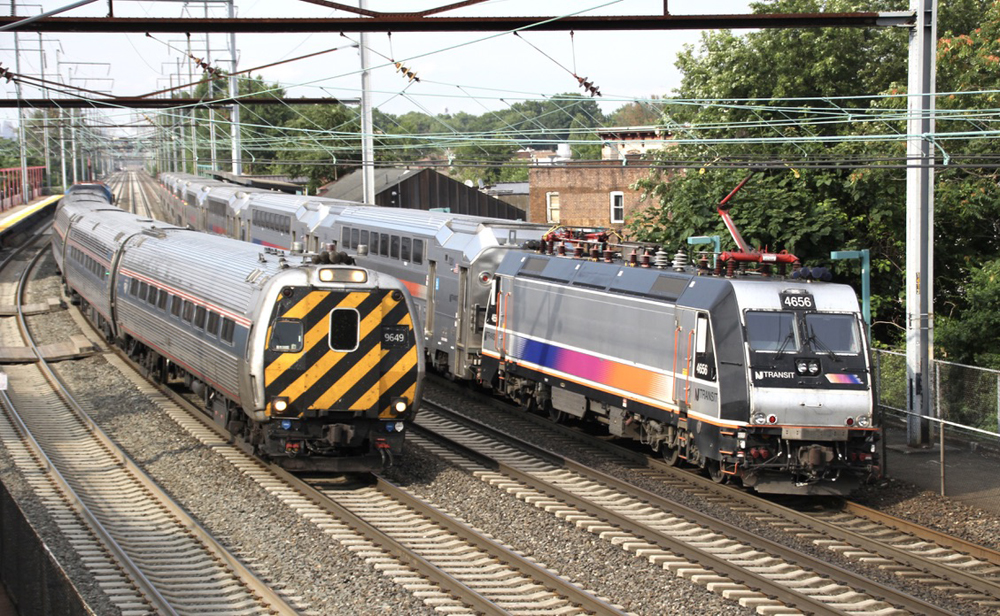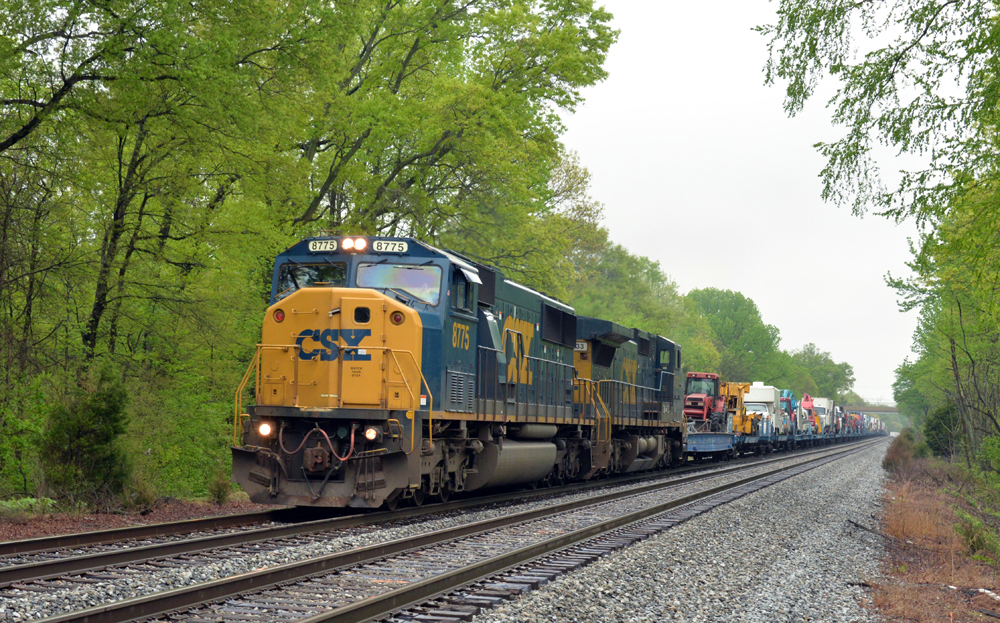
TAFT, Fla. – The James E. Strates Shows carnival train – which has hauled midway attractions to fairs up and down the East Coast since 1934 – may have unceremoniously made its last trip.
When the 45-car train was spotted on the two spurs adjacent to the Strates headquarters outside of Orlando, Fla., on Nov. 22, 2019, the family-run company had every intention of taking the show to the rails again in the spring. But no one anticipated the COVID-19 pandemic, which wiped out the annual fair schedule as mass gatherings were banned in 2020.
Fairs returned in 2021, but were scaled back due to pandemic-related capacity limits. The attendance caps upended the railroad economics for Strates. With smaller fairs and midways, it didn’t make sense to use the train and its ability to haul everything in the Strates inventory. The show hit the road in 2021, using trucks to reach fairs from Florida to Vermont.
Strates and CSX have been unable to reach a contract agreement, which has kept the train parked since the end of the 2019 season. CSX’s rates are now more expensive than trucking, Strates says, which makes it increasingly unlikely that the last carnival train will roll again.
“We have found ways to change our business model to an over-the-road show, just like we were back in the late 1920s and early 1930s,” Strates spokesman Marty Biniasz says. “But the train does mean so much to our heritage and our branding and also to our fair partners. Last year we celebrated our 100th anniversary in operation. This year an even bigger milestone in the industry is that we’re celebrating 100 years under the same contract banner with the Erie County Fair in Hamburg, N.Y.”
The third generation of the Strates – Senior Show Manager James E. “Jimmy” Strates, Director of Operations John Strates, Director of Finance Jay Strates, and Senior Administrator Susan Strates Magid – would love nothing more than to deliver the midway’s nearly 150 rides, games, and concessions to the Buffalo-area fairgrounds by train.
“We’re trying to do everything we can to at least get the train to Hamburg for the 100th anniversary of the Erie County Fair,” Jay Strates says. The train’s arrival near the fairgrounds on short line Buffalo Southern attracts a crowd that often numbers in the thousands.
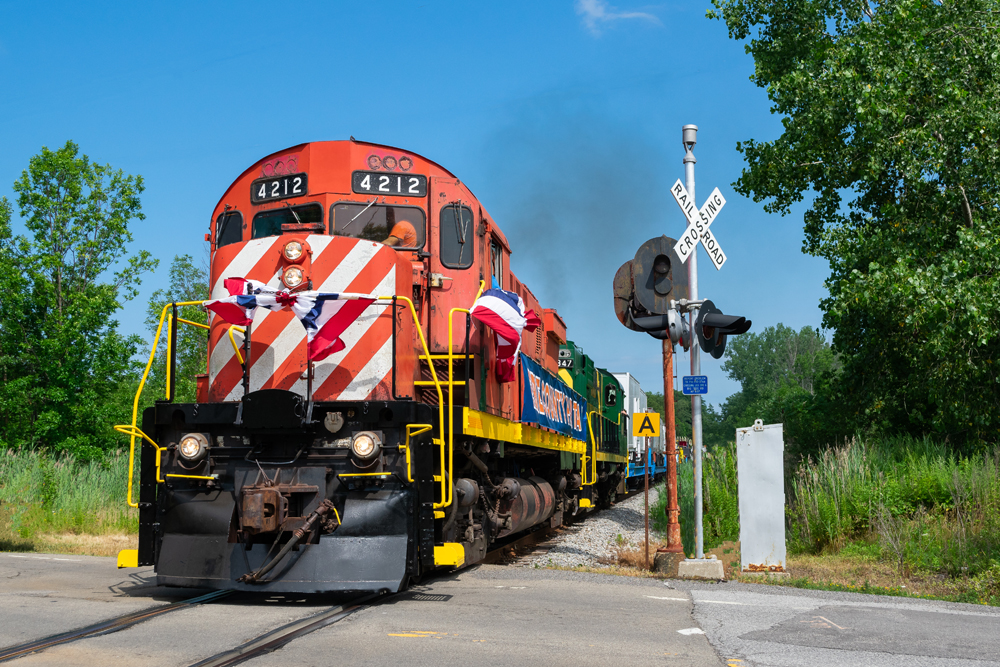
The Strates are proud of the family history and their role in keeping a slice of Americana alive. But they’re also shrewd businesspeople: Price trumps tradition.
CSX’s contract rate quotes for the Strates train have gone up more than 25% overall since the pandemic. Strates asked for tariff rates. They were more expensive than contract rates, which is not uncommon. The deal killer, though, was for the final two legs of the trip back to Orlando. The rate for moving from Augusta, Ga., to Tallahassee, Fla., via CSX and jumping from there to Orlando via a combination of Florida Gulf & Atlantic and CSX, more than doubled, making rail four times more expensive than trucking. Considering that, Strates has not bothered to seek rates from Norfolk Southern for its portion of the train’s traditional route.
“It’s important to understand that the choice here is not even terribly close,” Jimmy Strates says of moving by truck instead of train.
Train crew costs — a major component of the rate for a special unit train move — rose sharply under the national contract Congress imposed in 2022. It provided an immediate 14% bump in pay, retroactive to 2020. And engineer and conductor pay will rise 24% over the life of the five-year contract.
“CSX has a long history of working with the James E. Strates Shows and we appreciate the nostalgia of the carnival train in American culture. We have worked diligently to accommodate their transportation needs and we have offered them fair pricing for the dedicated, special train service they requested,” railroad spokeswoman Sheriee Bowman says.
The service requirements for the Strates train are tight. After a fair winds down on a Sunday, the loaded train must depart by late Monday night or in the wee hours of Tuesday in order to make it to its next destination in time to allow for unloading and midway setup for a Friday fair opening. “If we’re one day off from going from point A to point B, and we don’t make opening, we’re talking about a major financial loss not just for us, but for our fair and festival partner,” Biniasz says.
Based on those requirements, the Strates train would be the hottest train on the railroad — even rating above a CSX priority intermodal train that carries UPS traffic.
“We understand that Strates Shows has unique scheduling needs, but we cannot move their train at a loss or to the detriment of our other customers. We remain ready to work with them to find a solution, such as moving their cars in our merchandise or manifest service,” Bowman says.
CSX has often provided free or reduced cost transportation for nonprofit organizations, Bowman adds, but Strates is a for-profit business. “As is the case with all our customers, we value their business and are committed to working collaboratively to find solutions,” she says.
Moving into regular merchandise trains is a non-starter for the Strates. The service would simply be too slow and unreliable.
The fact is that trucks are easier, faster, and more flexible, the carnival company says. “Life could not be easier setting up a carnival without the train,” Jimmy Strates says.
Yet Jimmy Strates hates the fact that two things out of his control — first COVID, then rising rail rates — have sidelined the train. “If nothing else, I want to send it off the proper way if we’re never going to do it again,” he says.
Jimmy Strates says it’s no mystery why a special, highly service-sensitive seasonal train would not fit into CSX’s business plan.
“I can understand how economy of scale plays into a company’s decision. And if you’re moving coal out of West Virginia or you’re moving Tropicana orange juice, there’s a financial incentive based on economy of scale that Strates Shows doesn’t offer,” he says. “However, there’s the external equity factor that they can’t avoid. And that is that if I can move my heavy stuff cheaper by truck, so can everybody else.”
Some of Strates’ rides cannot move over the highway. The Top Spin, a popular thrill ride that whips riders through a series of flips, spins, and turns, weighs in at 185,000 pounds. The maximum gross load for a truck is 80,000 pounds, and it’s not practical to disassemble the Top Spin into truck-friendly pieces. Like the Strates train, it’s not going anywhere anytime soon.
The seeds of Strates’ shift to trucks were planted decades ago. In January 1994, the Ringling Ringling Brothers and Barnum & Bailey circus train derailed on CSX near Lakeland, Fla., killing an elephant trainer and a clown.
That prompted CSX to require that Strates carry an unattainable $200 million insurance policy. The prior requirement was for $5 million in coverage. Strates enlisted the aid of Buffalo-area Rep. Jack Quinn, CSX relented, and the train continued to roll but without passengers aboard. Instead Strates began to bus its workers from fair to fair, while using the passenger equipment as lodging near fair locations.
The episode was a wakeup call for Jimmy Strates. “If our business is reliant upon someone that can be this unreasonable, then they are an existential threat to our company,” he says. “I initiated a five-year plan to make us not dependent on the rail.”
Strates had already been using trucks to reach fairs in the Sunshine State. Eventually Strates began to use the train as a hub. From Middletown, N.Y., for example, Strates would use trucks to reach fairs in the Hudson Valley, in Connecticut, and out on Long Island. Then the equipment would be loaded back on the train for the trip to the Erie County Fair via a combination of Norfolk Southern and Buffalo Southern.
Strates stopped using its passenger equipment altogether in 2013, making the train a freight-only consist of flat cars with ramps that permit circus-style loading.
The hub experience helped Strates shift entirely to trucking in 2021, bringing the curtain down on the last carnival train. (Ringling Bros. stopped hauling its three-ring circus by train in 2017.)
“Looking back, we are the strongest family in the sense that we are the last carnival and circus train that made it,” John Strates says. “There’s nobody else running around putting up with all the headaches. And I do believe that … we just did everything we had to do as hard as we could to stay on the rails as long as we could.”
These days John Strates looks out the window at Strates headquarters, sees the light blue flat cars parked, and waxes nostalgic.
“I have very fond memories of growing up and living in a rail yard. We had a Pullman family car. Each of us had our state rooms or shared state rooms,” he says.
“It was a great place to be. You spent your summers and you were at the fairs, but when you left the fairgrounds, you always went to your own rail yard. And some of ’em were on the fairgrounds, very few, two or three on our whole route. But growing up on the train was great. And I miss traveling by train and living on the train,” he adds.
“As far as the way it evolved, and we didn’t have coaches anymore, and it all morphed slowly over my whole career to where we are now,” John Strates says.
Jimmy Strates laments the way railroads have changed over the years, with an increasing focus on profits while becoming less capable of handling special moves.
“It’d be nice if everyone just would recognize that yes, we don’t have the capabilities in our personnel that we had 20 years ago, and that’s why we don’t want to do it because we can’t do it. And really, I think it’s a statement of America,” he says.
Not being able or willing to accommodate a special seasonal train, he says, would be like the U.S. Postal Service saying it can’t handle Christmas cards anymore.
